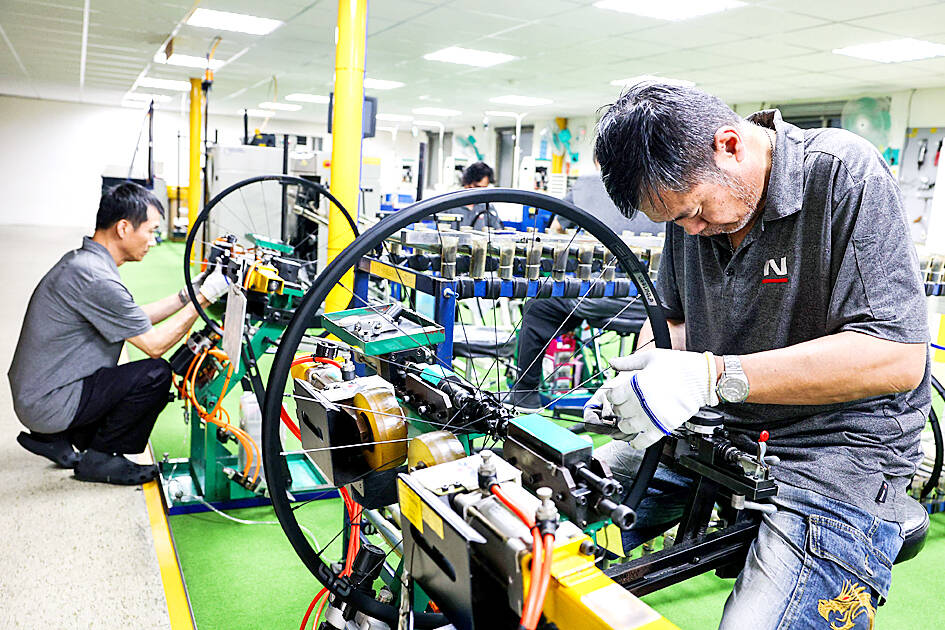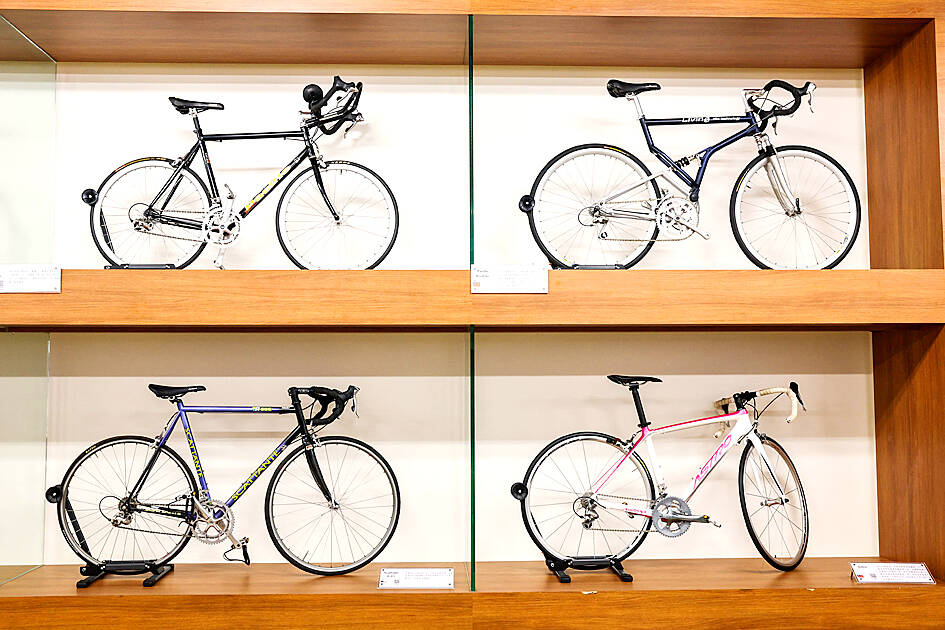Weeks after US President Donald Trump’s global tariff bombshell, Jeff Chen’s (陳松君) factory in Taiwan is as busy as ever turning out carbon and alloy wheels for high-end bicycles bound for US and European markets.
However, he wonders how much longer it will last. The US president’s initial 32 percent tariff on Taiwan stunned the country’s bicycle manufacturers, who were racing to meet orders ahead of the northern summer before the new toll was announced.
Some US customers immediately canceled or postponed shipments, only to reverse their decision when the hefty tariffs on Taiwan and many other US trading partners were paused for 90 days.

Photo: I-HWA CHENG, AFP
With a global 10 percent levy still in place and no clarity on what happens once the three months are up, Taiwanese bicycle companies and US buyers are in limbo.
“They don’t know what to do. There’s no time to respond,” said Chen, general manager of Joy Industrial Co (久裕興業), which makes wheels and hubs in Taichung.
Joy Industrial, founded by Chen’s grandfather in 1971, is one of more than 900 companies assembling bicycles or making components, including wheels, pedals and frames, mostly in central Taiwan, the nation’s manufacturing heartland.

Photo: I-HWA CHENG, AFP
Some companies have received a surge in orders as US customers rush to import bicycles and components before the end of the 90-day period.
Others, like Joy Group, have seen little change in demand, which Chen put down to inventory leftover from the COVID-19 pandemic, when retailers stocked up to meet surging demand for bicycles.
Chen said US customers had passed on the 10 percent tariff to consumers, but a 32 percent levy could put the brakes on further orders, with inevitable knock-on effects in Taiwan.
“If we are getting affected, then the company would need to think how to cut down... everybody will be facing the same issues,” said Chen, whose company also has four factories in China.
Taiwan has long been a key player in the global bicycle industry, but it faced an existential crisis more than two decades ago when an ascendant China drew many of the nation’s manufacturers to its shores.
Rather than try to compete with China’s cheaper, mass-produced two-wheelers, Taiwanese companies collaborated to upgrade their manufacturing techniques and produce quality bikes and components for high-end markets, mainly in Europe and the US.
While Taiwan’s export volume has fallen dramatically from around 10 million in the 1990s to 1.3 million last year, exacerbated by the pandemic glut, the average export price of its bicycles has risen sharply.
A traditional bike was valued at US$1,131 last year and an e-bike US$1,848, industry data and analyst reports show.
China, which exported more than 44 million bikes last year, had an average price of US$57.
Bicycle industry expert Michelle Hsieh (謝斐宇) said Taiwan’s success in targeting the high-end market was down to “hidden champions” in the supply chain.
Small and medium-sized companies — a hallmark of Taiwan’s manufacturing sector — were highly specialized and flexible, Hsieh said, making them “indispensable” in the global market.
“They are making things that other people cannot make so they have that competitive advantage,” said Hsieh, a sociologist at Academia Sinica in Taipei.
Trump’s hopes that higher tariffs would force firms to move their production to the US were dismissed by Taiwanese and US bicycle manufacturers as fanciful.
It would be “nearly impossible” to set up a factory in the US in the next three to five years, Taiwanese bicycle company Giant Manufacturing Co (巨大機械) said, citing higher costs, labor challenges and the lack of a “bicycle industry cluster.”
“Taichung is the absolute center of the bicycle industry,” said Tim Krueger, industry veteran and chief executive of US-based Esker Cycles, which imports frames and parts from Taiwan for its mountain bikes. “That’s where the expertise in the whole world is on how to properly manufacture bicycles.”
Some bike makers in Taiwan look set to benefit from the 145 percent tariff on Chinese products in the short term, with US customers seeking out Taiwanese suppliers, Hsieh said.
However, Tsai Po-ming (蔡博名) of the Cycling & Health Tech Industry R&D Center (自行車工業研究發展中心), which was set up in 1992 to help Taiwan’s industry become more competitive, said there could also be negatives.
Chinese manufacturers might try to offload their lower-end bikes in Europe if Trump’s tariffs fueled inflation, Tsai said.
“Consumers might feel that the prices are too high, and although our products are mid to high-end in quality, they might prefer to buy lower-priced models instead,” he said.
At Pacific Cycles Inc’s (太平洋自行車) factory near Taipei, workers assembled fold-up bicycles mostly destined for Europe and Asia.
While the company has little direct exposure to the US market, Pacific Cycles president Eva Lin (林伊華) said if one of its suppliers was hurt by the tariffs, then Pacific Cycles would be affected.
“The complete industry is like a big family,” she said. “No one can escape from the impact.”

Sweeping policy changes under US Secretary of Health and Human Services Robert F. Kennedy Jr are having a chilling effect on vaccine makers as anti-vaccine rhetoric has turned into concrete changes in inoculation schedules and recommendations, investors and executives said. The administration of US President Donald Trump has in the past year upended vaccine recommendations, with the country last month ending its longstanding guidance that all children receive inoculations against flu, hepatitis A and other diseases. The unprecedented changes have led to diminished vaccine usage, hurt the investment case for some biotechs, and created a drag that would likely dent revenues and

Macronix International Co (旺宏), the world’s biggest NOR flash memory supplier, yesterday said it would spend NT$22 billion (US$699.1 million) on capacity expansion this year to increase its production of mid-to-low-density memory chips as the world’s major memorychip suppliers are phasing out the market. The company said its planned capital expenditures are about 11 times higher than the NT$1.8 billion it spent on new facilities and equipment last year. A majority of this year’s outlay would be allocated to step up capacity of multi-level cell (MLC) NAND flash memory chips, which are used in embedded multimedia cards (eMMC), a managed

CULPRITS: Factors that affected the slip included falling global crude oil prices, wait-and-see consumer attitudes due to US tariffs and a different Lunar New Year holiday schedule Taiwan’s retail sales ended a nine-year growth streak last year, slipping 0.2 percent from a year earlier as uncertainty over US tariff policies affected demand for durable goods, data released on Friday by the Ministry of Economic Affairs showed. Last year’s retail sales totaled NT$4.84 trillion (US$153.27 billion), down about NT$9.5 billion, or 0.2 percent, from 2024. Despite the decline, the figure was still the second-highest annual sales total on record. Ministry statistics department deputy head Chen Yu-fang (陳玉芳) said sales of cars, motorcycles and related products, which accounted for 17.4 percent of total retail rales last year, fell NT$68.1 billion, or

In the wake of strong global demand for AI applications, Taiwan’s export-oriented economy accelerated with the composite index of economic indicators flashing the first “red” light in December for one year, indicating the economy is in booming mode, the National Development Council (NDC) said yesterday. Moreover, the index of leading indicators, which gauges the potential state of the economy over the next six months, also moved higher in December amid growing optimism over the outlook, the NDC said. In December, the index of economic indicators rose one point from a month earlier to 38, at the lower end of the “red” light.